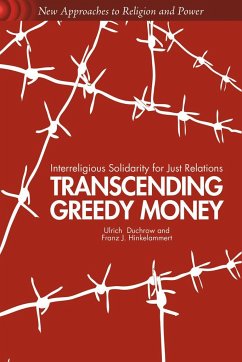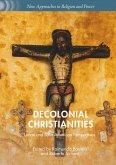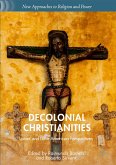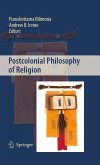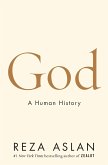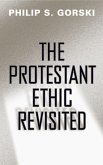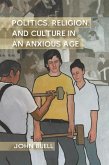This major work offers an historical description and systematic analysis of the root causes of this global economic crisis, which the authors understand as a crisis of western civilization. Secondly, they assume (and prove) that the religions of the Axial Age were shaped by the suffering of people, deepened by the emergence of a new economy based on money, private property and interest. They assume that the proven convergence of the Axial Age religions in responding to the social, psychological (and already ecological) consequences of the new economy can inform, motivate and empower faith communities and their members to join hands with social movements towards a new personal and collective culture of life. In part I they show the linkage between the contexts of antiquity and modernity concerning the role of money, private property and the related structures and mentalities of greed, producing suffering, and psychological, social and ecological destruction. They show how the religions of the Axial Age responded to this context in similar ways but with interesting specific emphases. In relation to today's situation we also raise the question of psychological hindrances to change in the different social classes, affected by neoliberalism, and how to overcome them. Before drawing the conclusions for present-day alliance-building between faith communities and social movements for alternatives to neoliberal globalization in Part III they offer a fundamental critique of the ambivalence of modernity in Part II.
"Ulrich Duchrow and Franz Hinkelammert's Transcending Greedy Money is a timely, pertinent and brilliant analysis and critique of modernity and western civilization. The current economic crisis and the consistent and continuing impoverization of people requires a courageous and alternative strategy to combat global greed and neoliberalism which produces suffering, loss, and exclusion. Duchrow and Hinkelammert chart a way forward by casting a critical eye on the modern economic system based on money, private property, and interest, and persuasively argue that religion can be a proactive impetus and liberatory mechanism for social movements and faith communities to forge a new future outside the shadow of neoliberal economics. This volume is indispensable reading for anyone concerned about socio-economic equality in a world dominated by profit and greed." - Farid Esack, Professor and Head, Department of Religion Studies, University of Johannesburg, South Africa
"Transcending Greedy Money: Interreligious Solidarity for Just Relations is a brilliant challenge to the materialism and selfishness that have accompanied the triumph of capitalist values in many contemporary religious traditions. Duchrow and Hinkelammert confront the misuse of the Bible to condone acts of injustice and destructive violence, the spread of the property-money-interest economy, coupled with imperial political structures, leading to increased material and psycho-spiritual suffering in advanced capitalist societies, and show how these very conditions are leading to new and potentially revolutionary developments that may bring us closer to the world both religious and secular people yearn for and spiritual progressives fight for! Challenging the spiritual void in leftist thinking, this book is indispensable for any religious or spiritual person who wants to see the world healed and transformed." - Rabbi Michael Lerner, editor of Tikkun Magazine www.tikkun.org, chair of The Network of Spiritual Progressives, and author of 11 books, most recently Embracing Israel/Palestine
"With diverse Biblical, Buddhist, and Islamic perspectives, Duchrow and Hinkelammert critique modernity (without falling into postmodernism) to build a radical new paradigm of collective human life on the planet." - François Houtart, professor emeritus, Catholic University of Louvain UCL, founder and advisor, CETRI ( Centre Tricontinental, a Belgian non-governmental organization), co-founder, World Social Forum, Fundación Pueblo Indio del Ecuador
"Transcending Greedy Money: Interreligious Solidarity for Just Relations is a brilliant challenge to the materialism and selfishness that have accompanied the triumph of capitalist values in many contemporary religious traditions. Duchrow and Hinkelammert confront the misuse of the Bible to condone acts of injustice and destructive violence, the spread of the property-money-interest economy, coupled with imperial political structures, leading to increased material and psycho-spiritual suffering in advanced capitalist societies, and show how these very conditions are leading to new and potentially revolutionary developments that may bring us closer to the world both religious and secular people yearn for and spiritual progressives fight for! Challenging the spiritual void in leftist thinking, this book is indispensable for any religious or spiritual person who wants to see the world healed and transformed." - Rabbi Michael Lerner, editor of Tikkun Magazine www.tikkun.org, chair of The Network of Spiritual Progressives, and author of 11 books, most recently Embracing Israel/Palestine
"With diverse Biblical, Buddhist, and Islamic perspectives, Duchrow and Hinkelammert critique modernity (without falling into postmodernism) to build a radical new paradigm of collective human life on the planet." - François Houtart, professor emeritus, Catholic University of Louvain UCL, founder and advisor, CETRI ( Centre Tricontinental, a Belgian non-governmental organization), co-founder, World Social Forum, Fundación Pueblo Indio del Ecuador

